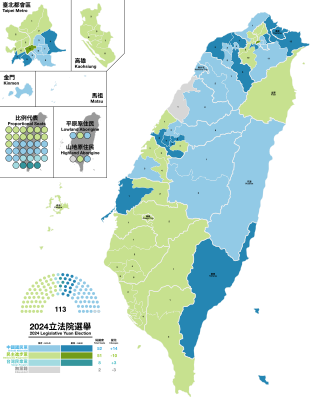Top Qs
Timeline
Chat
Perspective
2024 Taiwanese legislative election
From Wikipedia, the free encyclopedia
Remove ads
Legislative elections were held in Taiwan on 13 January 2024 to elect members of the Legislative Yuan. The elections were held alongside presidential elections.[1][2]
You can help expand this article with text translated from the corresponding article in Chinese. (May 2023) Click [show] for important translation instructions.
|
The results saw the ruling Democratic Progressive Party (DPP) lose its majority in the Legislative Yuan that it had held since 2016, losing 11 seats and retaining 51, while the Kuomintang (KMT) became the largest single party with 52 seats, and the Taiwan People's Party (TPP) won eight seats. The New Power Party lost all its three seats after failing to win a constituency seat or meet the 5% threshold for at-large representation. The election marked the first time under the current electoral system (introduced in 2008) that no party held an absolute majority in the Legislative Yuan,[3] and the first in which the largest party in the legislature won neither the most constituency votes nor the most party votes. The term of the Legislative Yuan began on 1 February 2024.
Remove ads
Electoral system
Members were elected by parallel voting. 73 members were elected by first-past-the-post, 6 reserved for indigenous candidates by single non-transferable vote, and 34 by party-list proportional representation.
Contesting parties and candidates
A total of 315 candidates registered for first-past-the-post seats in the 2024 legislative election.[4] Sixteen political parties submitted party lists to the Central Election Commission (CEC). A total of 178 nominees were included on party lists.[5] On 15 December 2023, the CEC announced that six first-past-the post candidates, one candidate running for a reserved indigenous seat, and one party list candidate, were ineligible.[6] The campaign period officially started on 16 December 2023.[7]
Remove ads
Results
Summarize
Perspective
The Kuomintang won 52 seats, making it the largest single party in the Legislative Yuan. The DPP, having won 51 seats, declined to the second largest party in the Legislative Yuan. The Taiwan People's Party (TPP) ranked the third with 8 seats under its control. The DPP lost 11 seats in the election, which also meant the loss of the parliamentary majority that it had held since 2016. The election results also led to the removal of the New Power Party, which previously held three seats, from the Legislative Yuan after it failed to win a constituency seat or meet the 5% threshold needed to win at-large seats. Two independents, namely Chen Chao-ming and Kao Chin Su-mei, who were members of the Kuomintang caucus in the 10th Yuan, were also elected.[3]
The election was the first in Taiwanese history in which the party that received the most votes did not win the most seats, and also marked the first time since 2004 that no party held an absolute majority in the Legislative Yuan.[3] This put the TPP in a "kingmaker" position; it also meant that the TPP’s support was crucial in the selection of the President of the Legislative Yuan and the major policies.[8]
The election was also the first time that an openly bisexual candidate,[9] Huang Jie (DPP) of Kaohsiung city's sixth constituency, was elected to the Legislative Yuan.[10] It was also the first time that an openly transgender person, Abbygail ET Wu of the Green Party (at-large), ran for the chamber, albeit unsuccessfully.[11]
By constituency
By National-at-large
National-at-large legislators are apportioned by largest remainder method. Political parties will gain seats upon reaching the 5% threshold and allocated based on total votes. The quota remains as 2.9412%, each political party will be allocated a seat. The remainder will be allocated based on the largest remainder (Remainder: Democratic Progressive Party 0.7244%; Kuomintang 1.9683%; Taiwan People's Party 0.2496%).
| Democratic Progressive Party | Kuomintang | Taiwan People's Party |
| Lin Yueh-chin Puma Shen Ariel Chang Hung Sun-han Loh Meei-ling You Si-kun Fan Yun Ker Chien-ming Shen Fa-hui Chuang Jui-hsiung Michelle Lin Jean Kuo Chen Pei-yu |
Han Kuo-yu Ko Chih-en Ko Ju-chun Weng Hsiao-ling Chen Jing-hui Wu Tsung-hsien Lin Chien-chi Chen Yeong-kang Hsu Yu-chen Hsieh Lung-chieh Su Ching-chuan Chang Chia-chun Wang Yu-min |
Huang Shan-shan Huang Kuo-chang Chen Gau-tzu Wu Chun-cheng Mạch Ngọc Trân Lin Kuo-cheng Lin Yi-chun Chang Chi-kai |
Remove ads
Aftermath
At the opening of the new Legislative Yuan on 1 February 2024, Han Kuo-yu of the Kuomintang was elected as President of the Legislative Yuan following two rounds of voting in which all eight members of the TPP abstained in the second round. Han obtained the support of the KMT's 52 members in the Legislative Yuan as well as two independents[12] and defeated the DPP's You Si-kun and the TPP's Huang Shan-shan. The KMT's Johnny Chiang was also elected as deputy speaker, defeating the DPP's Tsai Chi-chang and the TPP's Chang Chi-kai.[13]
Remove ads
See also
Notes
- The former legislator of this constituency, Lin Yi-hua of the Kuomintang, resigned in February 2023 to take the position of deputy mayor of Taipei. Since the remaining term was less than one year, no by-election was held. Source: "Legislator's plan to delay Taipei post questioned". Taipei Times. 2022-12-25. Retrieved 2024-01-21.
Remove ads
References
Wikiwand - on
Seamless Wikipedia browsing. On steroids.
Remove ads






